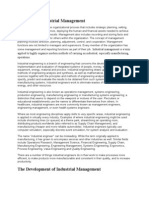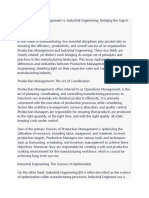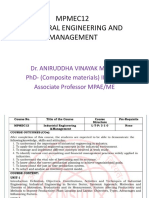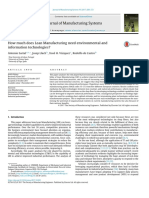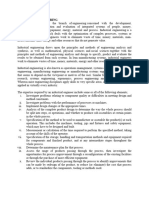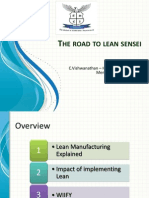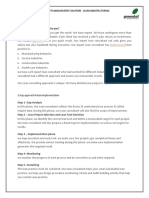Week 11
Week 11
Uploaded by
ulasguneyyCopyright:
Available Formats
Week 11
Week 11
Uploaded by
ulasguneyyOriginal Description:
Original Title
Copyright
Available Formats
Share this document
Did you find this document useful?
Is this content inappropriate?
Copyright:
Available Formats
Week 11
Week 11
Uploaded by
ulasguneyyCopyright:
Available Formats
The Role of Industrial Engineering in Enhancing Operational Efficiency
Industrial Engineering, as a discipline, plays a pivotal role in shaping the efficiency and
productivity of various industries. It revolves around the application of engineering principles to
optimize processes, reduce waste, and enhance overall operational efficiency. This essay delves into
the fundamental principles of industrial engineering, its real-world applications, and how these
techniques contribute to sustainable and innovative practices.
Fundamental Principles:At its core, industrial engineering focuses on designing, analyzing,
and improving systems and processes. It integrates principles from engineering, mathematics, and
the physical and social sciences to create efficient systems. One key principle is systems thinking,
which involves viewing an organization as an interconnected and interdependent system of
processes. This holistic approach enables industrial engineers to identify areas for improvement and
implement changes that positively impact the entire system.
Optimizing Processes:The primary goal of industrial engineering is to optimize processes to
achieve maximum efficiency. This involves streamlining workflows, eliminating bottlenecks, and
minimizing waste. For instance, in manufacturing, industrial engineers may use techniques like Lean
Manufacturing or Six Sigma to reduce defects and enhance production speed. These methodologies
ensure that resources are utilized efficiently, resulting in cost savings and improved product quality.
Real-World Examples:The impact of industrial engineering is evident across various
industries. In healthcare, for instance, industrial engineers work to optimize patient flow, reduce
waiting times, and improve overall hospital efficiency. Through the application of industrial
engineering principles, hospitals can enhance patient care, reduce costs, and allocate resources
more effectively.
In the logistics and supply chain industry, industrial engineers play a crucial role in optimizing
transportation routes, inventory management, and warehouse operations. By implementing
advanced analytics and modeling techniques, they contribute to the development of more
sustainable and cost-effective supply chain solutions.
Sustainable and Innovative Practices: Industrial engineering is not only about efficiency but
also about sustainability. By optimizing processes, reducing waste, and improving resource
utilization, industrial engineers contribute to environmentally friendly practices. For instance, in
manufacturing, the implementation of sustainable production methods not only reduces the
environmental impact but also aligns with the growing demand for eco-friendly products.
Furthermore, industrial engineers drive innovation by adopting cutting-edge technologies.
The integration of automation, data analytics, and artificial intelligence into industrial processes
enhances efficiency, accuracy, and responsiveness. These innovations not only optimize current
practices but also pave the way for future advancements in industrial engineering.
In conclusion, industrial engineering serves as a cornerstone for enhancing operational
efficiency across diverse industries. Its fundamental principles, focused on optimizing processes,
have a tangible impact on cost reduction, quality improvement, and sustainability. Real-world
examples demonstrate the versatility of industrial engineering applications, while the commitment
to innovation ensures that this field remains at the forefront of shaping the industries of tomorrow.
As industries continue to evolve, the role of industrial engineering will be crucial in driving efficiency,
sustainability, and innovation.
Multiple Choice Questions:
1. What is the primary goal of industrial engineering?
a) Maximizing profits b) Minimizing costs c) Optimizing processes d) Enhancing product
quality
2. Which principle involves viewing an organization as an interconnected and interdependent
system of processes?
a) Linear thinking b) Circular thinking c) Systems thinking d) Sequential thinking
3. Which methodology is commonly used in manufacturing to reduce defects and enhance
production speed?
a) Agile b) Lean Manufacturing c) Scrum d) Waterfall
4. In healthcare, how do industrial engineers contribute to efficiency?
a) Optimizing transportation routes b) Reducing waiting times c) Enhancing marketing
strategies d) Increasing product variety
5. What is one area in logistics and supply chain where industrial engineers play a crucial
role?
a) Social media management b) Inventory management c) Event planning d) Graphic design
6. How does industrial engineering contribute to environmentally friendly practices?
a) By maximizing profits b) By optimizing processes c) By increasing waste d) By ignoring
sustainability
7. Which technologies are mentioned as driving innovation in industrial engineering in the
essay?
a) Steam engines b) Typewriters c) Automation, data analytics, and artificial intelligence d)
Telegraphs
8. What role does industrial engineering play in shaping the industries of tomorrow?
a) It has no significant role
b) It hinders progress
c) It focuses on outdated practices
d) It contributes to efficiency, sustainability, and innovation
Open-Ended Questions:
1. Explain how industrial engineering principles can be applied in a non-manufacturing
industry of your choice.
2. Provide an example of how Lean Manufacturing can be implemented in a specific
manufacturing process.
3. Discuss the potential challenges of integrating artificial intelligence into industrial
engineering processes.
4. How might industrial engineering contribute to making a company more environmentally
sustainable?
5. In what ways can industrial engineers foster a culture of innovation within an
organization?
You might also like
- NETFLIX. Management Case StudyDocument9 pagesNETFLIX. Management Case StudyMarina KhoperiaNo ratings yet
- 01 - Introduction To Industrial Eng - r1Document23 pages01 - Introduction To Industrial Eng - r1Eddy FazwanNo ratings yet
- Concepts of Industrial ManagementDocument9 pagesConcepts of Industrial ManagementSandeep Shrivastava50% (2)
- Chris Harris, Rick Harris - Lean Connections - Making Information Flow Efficiently and Effectively-Productivity Press (2008) PDFDocument166 pagesChris Harris, Rick Harris - Lean Connections - Making Information Flow Efficiently and Effectively-Productivity Press (2008) PDFAnibal DazaNo ratings yet
- Applications of Industrial EngineeringDocument1 pageApplications of Industrial EngineeringSuhailShaikhNo ratings yet
- The Role of An Industrial EngineerDocument2 pagesThe Role of An Industrial EngineerSuhailShaikhNo ratings yet
- Production Management Vs Industrial Engineering Bridging The Gap in ManufacturingDocument3 pagesProduction Management Vs Industrial Engineering Bridging The Gap in ManufacturingSuhailShaikhNo ratings yet
- Industrial Engineering: Dr. Usama Jasim NaeemDocument10 pagesIndustrial Engineering: Dr. Usama Jasim NaeemAli Hassan AHNo ratings yet
- Ingeniería IndustrialDocument20 pagesIngeniería IndustrialDaniel ReyesNo ratings yet
- Industrial EngineerDocument3 pagesIndustrial EngineerpriyasubhaNo ratings yet
- Production TechnologyDocument6 pagesProduction TechnologyMarshal Haroun GNo ratings yet
- Castillo Coaquira EdsonDocument10 pagesCastillo Coaquira EdsonEdson C. CastilloNo ratings yet
- P - Engineering - The Profession - Ali Alshehri - 2139119Document8 pagesP - Engineering - The Profession - Ali Alshehri - 2139119علي الشهريNo ratings yet
- Industrial Engineering and Its RelevanceDocument25 pagesIndustrial Engineering and Its RelevanceSavantNo ratings yet
- Manufacturing ProcessDocument3 pagesManufacturing Processg-ipgp23271000No ratings yet
- Artículo 3Document6 pagesArtículo 3JuanCamiloNo ratings yet
- Thrust Area PPT - PLM REV-01Document39 pagesThrust Area PPT - PLM REV-01Raghvendra Pratap SinghNo ratings yet
- Exposicion de InglesDocument4 pagesExposicion de InglesFERNANDO MENDOZA GONZALEZNo ratings yet
- Digital Transformation in A Traditional IndustryDocument8 pagesDigital Transformation in A Traditional IndustryvishwanathhbnNo ratings yet
- Lean Thinking Through The Perspective of The Construction IndustryDocument23 pagesLean Thinking Through The Perspective of The Construction IndustryIVANDALE GUNDRANNo ratings yet
- Industrial Engineering Thesis ExamplesDocument6 pagesIndustrial Engineering Thesis Examplesstefanieyangmanchester100% (3)
- What Is Manufacturing Engineering?Document50 pagesWhat Is Manufacturing Engineering?mariappanNo ratings yet
- Affect of Technology On Project Management PracticeDocument7 pagesAffect of Technology On Project Management PracticeWajiha KhalidNo ratings yet
- R - Engineering - The Profession - Ali Alshehri - 2139119Document9 pagesR - Engineering - The Profession - Ali Alshehri - 2139119علي الشهريNo ratings yet
- 01 - Introduction To Industrial EngDocument16 pages01 - Introduction To Industrial EngsoqhNo ratings yet
- 1 1999 Kosturiak J. Comput Ind Simulation in Production System Life CycleDocument14 pages1 1999 Kosturiak J. Comput Ind Simulation in Production System Life CycleLaura Veronika Diah MousehunterNo ratings yet
- Regina Problem DomainDocument62 pagesRegina Problem DomainRmoodiRNo ratings yet
- The Role of Industrial EngineerDocument4 pagesThe Role of Industrial EngineerMuhammad Khizar MajeedNo ratings yet
- Preprints201807 0517 v1Document17 pagesPreprints201807 0517 v1tantibaNo ratings yet
- 945-Article Text-2421-1-10-20240322Document12 pages945-Article Text-2421-1-10-20240322quynhntdonline.nevigroupNo ratings yet
- wcm kết hợp 4.0Document17 pageswcm kết hợp 4.0Tien Dung PhanNo ratings yet
- Condition Based Maintenance in The Manufacturing Industry: From Strategy To ImplemetnationDocument103 pagesCondition Based Maintenance in The Manufacturing Industry: From Strategy To ImplemetnationRohanNo ratings yet
- Revista de Ingeniera y Tecnologa para Aplicaciones IndustrialesDocument7 pagesRevista de Ingeniera y Tecnologa para Aplicaciones IndustrialesJml rhNo ratings yet
- 2015 - JUE - SAVSEK T - Transdisciplinary Product DevelopmentDocument12 pages2015 - JUE - SAVSEK T - Transdisciplinary Product Developmentis03lcmNo ratings yet
- Critical Study On Vital Factors Influencing Productivity ImprovementDocument8 pagesCritical Study On Vital Factors Influencing Productivity ImprovementIJRASETPublicationsNo ratings yet
- Mpmec12 Industral Engineering and ManagementDocument38 pagesMpmec12 Industral Engineering and ManagementNITIN NAUTIYALNo ratings yet
- Case Study On Lean Manufacturing System Implementation in Batch Type Manufacturing IndustryDocument18 pagesCase Study On Lean Manufacturing System Implementation in Batch Type Manufacturing IndustryCool BuddyNo ratings yet
- 1 Piece FlowDocument6 pages1 Piece FlowMichael GilreathNo ratings yet
- Lean Product Lifecycle Management Approach: Valentina GecevskaDocument8 pagesLean Product Lifecycle Management Approach: Valentina GecevskaKonstantin KovalenkoNo ratings yet
- 1 s2.0 S2214993723000520 MainDocument13 pages1 s2.0 S2214993723000520 MainshahzadkhurramrajaNo ratings yet
- Journal of Manufacturing Systems: Antonio Sartal, Josep Llach, Xosé H. Vázquez, Rodolfo de CastroDocument13 pagesJournal of Manufacturing Systems: Antonio Sartal, Josep Llach, Xosé H. Vázquez, Rodolfo de Castroinfo_azeetNo ratings yet
- ME 4103 - IE-1. IntroductionDocument31 pagesME 4103 - IE-1. IntroductionasanNo ratings yet
- Dyeep: Tema: TemaDocument26 pagesDyeep: Tema: TemaAlevj DbNo ratings yet
- Dokumen - Pub - Additive Manufacturing Design Processes and Applications 3031337921 9783031337925Document139 pagesDokumen - Pub - Additive Manufacturing Design Processes and Applications 3031337921 9783031337925Ahmed AlbrashiNo ratings yet
- Research Proposal For IdrissDocument10 pagesResearch Proposal For IdrissMoses UdoisohNo ratings yet
- Production Model Based On Total Productive Maintenance and Systematic Layout Planning To Increase Productivity in The Metalworking IndustryDocument5 pagesProduction Model Based On Total Productive Maintenance and Systematic Layout Planning To Increase Productivity in The Metalworking IndustrySolci AbantoNo ratings yet
- Operation Management Navnit PGFA2062Document2 pagesOperation Management Navnit PGFA2062NAVNIT CHOUDHARYNo ratings yet
- Product Design and DevelopmentDocument27 pagesProduct Design and DevelopmentGur- FeatNo ratings yet
- MODULE 1-INDUSTRIAL ENGINEERING-ktustudents - inDocument33 pagesMODULE 1-INDUSTRIAL ENGINEERING-ktustudents - inSandeep ThomasNo ratings yet
- Industrial Engineering: An OverviewDocument3 pagesIndustrial Engineering: An OverviewniltonanyosarivasNo ratings yet
- Sustainable Optimization of Manufacturing Process Effectiveness in Furniture ProductionDocument15 pagesSustainable Optimization of Manufacturing Process Effectiveness in Furniture ProductionBrianRungenNo ratings yet
- Product Lifecycle Management Notes (Mechanical Engineering)Document16 pagesProduct Lifecycle Management Notes (Mechanical Engineering)ususama78No ratings yet
- Nterprise Erformance and Business Processes: Rocess of Innovation in Product Lifecycle Management Business StrategyDocument4 pagesNterprise Erformance and Business Processes: Rocess of Innovation in Product Lifecycle Management Business StrategyAdam StevensonNo ratings yet
- Industrial and ProductionDocument4 pagesIndustrial and ProductionnetsimastudioNo ratings yet
- Potential Advantage of Using Concurrent EngineeringDocument3 pagesPotential Advantage of Using Concurrent EngineeringHarish ChandranNo ratings yet
- Amity Assignmnt-Operation ManagementDocument34 pagesAmity Assignmnt-Operation ManagementAnkita Srivastav100% (1)
- Materials Today: Proceedings: Sivakumar Annamalai, H. Vinoth Kumar, N. BagathsinghDocument5 pagesMaterials Today: Proceedings: Sivakumar Annamalai, H. Vinoth Kumar, N. BagathsinghMohammed BabkirNo ratings yet
- A Mudanca SocialDocument13 pagesA Mudanca SocialAna Maria Holoca José AnethNo ratings yet
- Algorithms 17 00098 v2Document22 pagesAlgorithms 17 00098 v2jamel-shamsNo ratings yet
- Mechanical Production Engineer Success: Careers, Interview Q&A, and TerminologyFrom EverandMechanical Production Engineer Success: Careers, Interview Q&A, and TerminologyNo ratings yet
- Maintenance Excellence: Principles, Practices, and Future TrendsFrom EverandMaintenance Excellence: Principles, Practices, and Future TrendsNo ratings yet
- Taguchi on Robust Technology Development: Bringing Quality Engineering UpstreamFrom EverandTaguchi on Robust Technology Development: Bringing Quality Engineering UpstreamRating: 1 out of 5 stars1/5 (1)
- Lean Manufacturing - An IntroductionDocument44 pagesLean Manufacturing - An IntroductionSiva Rama Krishna Patimalla100% (1)
- IPCDocument16 pagesIPCRahul RainaNo ratings yet
- Lean - A Cultural IssueDocument7 pagesLean - A Cultural IssuemrragnoNo ratings yet
- Lean ManufacturingDocument6 pagesLean ManufacturingGreendotNo ratings yet
- Creating A Lean RD System Lean Principles and Approaches For Pharmaceutical and Research-Based Organizations by Terence M BarnhartDocument258 pagesCreating A Lean RD System Lean Principles and Approaches For Pharmaceutical and Research-Based Organizations by Terence M BarnhartDhrithi100% (1)
- CMA Inter GR I (Cost Accounting) TheoryDocument25 pagesCMA Inter GR I (Cost Accounting) TheoryManav JainNo ratings yet
- Amazon Case StudyDocument26 pagesAmazon Case StudySteven JonathanNo ratings yet
- Lean Production & QualityDocument47 pagesLean Production & QualityOckouri Barnes100% (1)
- OM M1 Intro and Overview Student NotesDocument27 pagesOM M1 Intro and Overview Student NotesChandan SainiNo ratings yet
- Case Study 1Document21 pagesCase Study 1harshalNo ratings yet
- 5 S - Workplace Organization Visual Management Work StandardizationDocument46 pages5 S - Workplace Organization Visual Management Work StandardizationKarthick Murugesan100% (1)
- RKQPDocument12 pagesRKQPmakanbhupindersinghNo ratings yet
- Assignment On Lean Manufacturing and Six SigmaDocument10 pagesAssignment On Lean Manufacturing and Six SigmaRatul BhowmikNo ratings yet
- Training Within Industry (TWI)Document46 pagesTraining Within Industry (TWI)Paulocanario100% (2)
- GodrejDocument149 pagesGodrejPrince Satish Reddy50% (2)
- Cost Reduction Techniques in Press Part ProductionDocument7 pagesCost Reduction Techniques in Press Part Productionramanamurtytv7176No ratings yet
- Lean NewsletterDocument3 pagesLean NewsletterKomal TagraNo ratings yet
- Joie621296160200 PDFDocument12 pagesJoie621296160200 PDFAnonymous q59D2ZzN4uNo ratings yet
- 20 Steps For Manufacturing ExcellenceDocument2 pages20 Steps For Manufacturing ExcellenceDharmvir UppalNo ratings yet
- Operation Management of WalmartDocument16 pagesOperation Management of WalmartJessNo ratings yet
- Last Planner SystemDocument9 pagesLast Planner SystemFladimir Bautista GarcíaNo ratings yet
- 2 - Define - Six Sigma FundamentalsDocument31 pages2 - Define - Six Sigma FundamentalsmebreaNo ratings yet
- Implementation of Lean Six Sigma Through ISO 90012008Document13 pagesImplementation of Lean Six Sigma Through ISO 90012008Fikri IlhamNo ratings yet
- Accenture The Long View of The Chip ShortageDocument20 pagesAccenture The Long View of The Chip ShortageOso genialNo ratings yet
- Chapter 4 The 3 Es of Operation Al ExcellenceDocument13 pagesChapter 4 The 3 Es of Operation Al ExcellenceJimmy Ong Ah HuatNo ratings yet
- Secondary ToolsDocument26 pagesSecondary ToolsAshishBohraNo ratings yet
- Unit 4 OMDocument16 pagesUnit 4 OMKRANTINo ratings yet
- Daellenbach, Hans (2005) - Management Science Decision Making Through Systems ThinkingDocument44 pagesDaellenbach, Hans (2005) - Management Science Decision Making Through Systems Thinkingprofesoon indonesiaNo ratings yet


